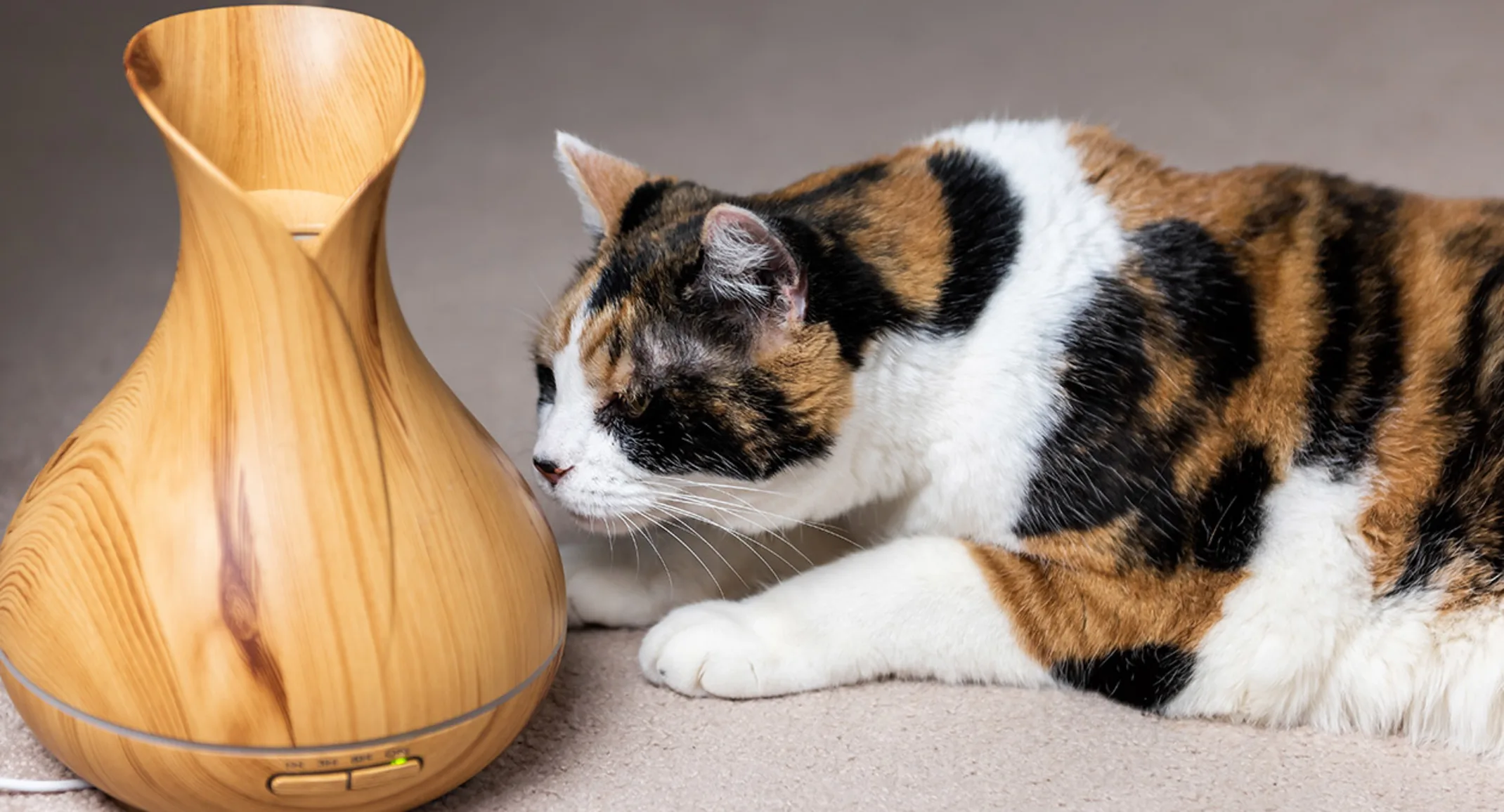Essential Pet Safety for Essential Oils
The Exam Room

To say that essential oils are popular is an understatement. These compounded plant extracts are common aromatherapy and alternative medicine staples. Despite essential oils’ popularity, no evidence-backed research currently shows that their use cures any illnesses. Although essential oils may be beneficial—such as for mood elevation or stress relief—research results remain inconclusive.
Regardless of the science, essential oils’ popularity may lead you to wonder whether their use is safe for pets. The answer is complicated. In their most concentrated form (100%), essential oils can be harmful to your pet—and some oils are more harmful than others. Learn how to keep your pet safe from essential oils’ potential harm.
What are essential oils?
Essential oils are plant extracts derived from various plant parts—such as the flowers, bark, leaves, or fruit—to capture their fragrance compounds. To collect and concentrate the compounds into oils, producers use different methods—distillation (via steam and/or water) or mechanical methods, such as cold pressing. Several pounds of a plant produce a single bottle of essential oil. The following are the most commonly used oils:
Lavender
Peppermint
Eucalyptus
Lemon
Mandarin orange
Patchouli
Rose
Chamomile
Rosemary
Tea tree
Clary sage
Cypress
Fennel
Ginger
How are essential oils used?
Aromatherapy is the centuries-old practice of using essential oils for therapeutic benefit. When used in aromatherapy, essential oils are administered using the following methods:
Inhaled — When inhaled, essential oils’ scent molecules travel from the olfactory nerves to the amygdala—the brain region primarily associated with emotional processes.
Absorption — To help relax a client’s tight muscles, a massage therapist might add a drop or two of essential oil to their hands. You can also add essential oils to bath salts to create a soothing, aromatic soak.
Essential oils’ popularity has continually risen over the years. In addition to aromatherapy, for aroma enhancement, essential oils are often added to many products, including cosmetics, soaps, lotions, and perfumes.
What factors affect the safety of essential oils for pets?
Because they can cause skin irritation in their concentrated form, most essential oils on the market are diluted by the addition of carrier oils. Depending on an essential oil’s concentration level, the carrier oil, and other added ingredients, some commercially available essential oils are more harmful to your pet than others. However, because the concentration and formulations can vary, avoid applying essential oils directly to your pet’s fur or skin. To prevent your pet’s contact with or ingestion of essential oils, keep these oils stored securely out of your pet’s reach.
Which essential oils are most harmful to pets?
Some essential oils are more harmful to your pet than others, with some being toxic. Prevent your pet’s ingestion and skin exposure to the following essential oils:
Cinnamon
Citrus
Pennyroyal
Peppermint
Pine
Sweet birch
Tea tree
Wintergreen
Ylang ylang
What are the signs of essential oil poisoning in pets?
Essential oils are rapidly absorbed orally or through the skin, and many of their chemicals are metabolized through the liver, making pets with pre-existing liver issues more sensitive to their effects. Depending on a product’s concentration level and ingredients, an essential oil poisoning’s severity can vary, and your pet may exhibit the following signs:
Difficulty breathing
Uncoordinated gait
Drooling
Lethargy
Weakness
Muscle tremors
Mouth or facial pawing
Lip, gum, tongue, or skin redness or burns
Vomiting
A pet with essential oil poisoning must receive prompt veterinary treatment. If you suspect your pet has ingested or come in contact with an essential oil, immediately contact your veterinarian or the Pet Poison Helpline. Unless your veterinarian has instructed you to do so, do not induce vomiting or give activated charcoal to your pet.
How is essential oil poisoning treated in pets?
With early intervention and supportive treatment, most pets will fully recover from essential oil poisoning. However, keep in mind that the sooner your pet receives treatment for essential oil poisoning, the better their prognosis. Your veterinarian will perform blood work to determine if your pet’s liver and kidneys have been affected, and they may administer intravenous (IV) fluids. Their symptoms’ severity will determine your pet’s essential oil poisoning treatment, which may include:
Anti-vomiting medication
Stomach protectants
Pain medication
Liver-protecting medication
The most effective way to prevent your pet from coming in contact with or ingesting essential oils is to store these products out of their reach. Do not leave open essential oil containers where your pet can knock them over, because they might spill these toxins on their fur or skin, or ingest these poisonous compounds. If your pet ingests any toxin, use this locator tool to find an urgent care or emergency veterinary practice near you.
